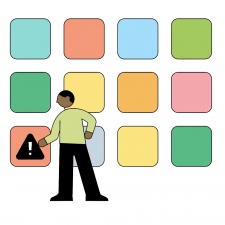Apple stopped more than $2 billion in fraudulent transactions in 2022, according to a blog post on its site.
The company rejected almost 1.7 million app submissions which it states failed “to meet the App Store’s high standards for privacy, security, and content.”
The timing of the blog - highlighting the unique and extensive work that Apple puts in to police its ecosystem and App Store and it's success at weeding out of bad actors - seems particularly pertinent given that they are about to have their hand forced into opening up their lockdown due to EU regulation.
While many see the 'opening' of iOS as a good thing - allowing developers to circumvent Apple's 30% 'tax' on appearing in Store and their rules (which often appear opaque and Apple-biased) - it's clear that Apple see such moves as anything but.
The apps that Apple blocked include almost 29 thousand app submissions which contained hidden or undocumented features, nearly 400 thousand apps violating privacy guidelines, and over 153 thousand for scam, copycats, or misleading users.
The danger of fraudulent apps
As well as taking action against apps, Apple has taken action against both developers and users engaged in fraudulent activity.
Additionally, the company terminated 428 thousand developer accounts which it felt were engaged in potentially fraudulent activity, blocked the accounts of 105 thousand fraudulent developers, and deactivated the fraudulent accounts of 282 million customers.
“Over the years, Apple has improved its systems to continuously monitor and detect account fraud quickly. In 2021, Apple terminated over 802,000 developer accounts for potentially fraudulent activity. In 2022, that number declined to 428,000 thanks in part to new methods and protocols that allow the App Store to prevent the creation of potentially fraudulent accounts. Additionally, nearly 105,000 Apple Developer Program enrollments were rejected for suspected fraudulent activities, preventing these bad actors from submitting apps to the App Store.”
On average, Apple’s team reviews over 100 thousand app submissions every week, with almost 90% receiving a review within 24 hours. 2022 saw Apple review more than 6.1 million apps reviewed, with more than 185 thousand developers publishing their first apps and over 200 thousand phone calls made to developers to resolve whatever issues led to their submissions being rejected. This could help to ensure the security of not just the platform, but the entire app ecosystem by giving developers the tools and information they need to help keep their apps secure.
Last month, Apple was forced to allow game makers to take payment through third-party sites, circumventing the commission fee for in-app purchases on payments made through the app store. We expect to see just how Apple will abide by the EU rules and how an 'open iOS' (at least in Europe) could work as new features are revealed in iOS 17's first airing at the upcoming WWDC event on June 5.






















